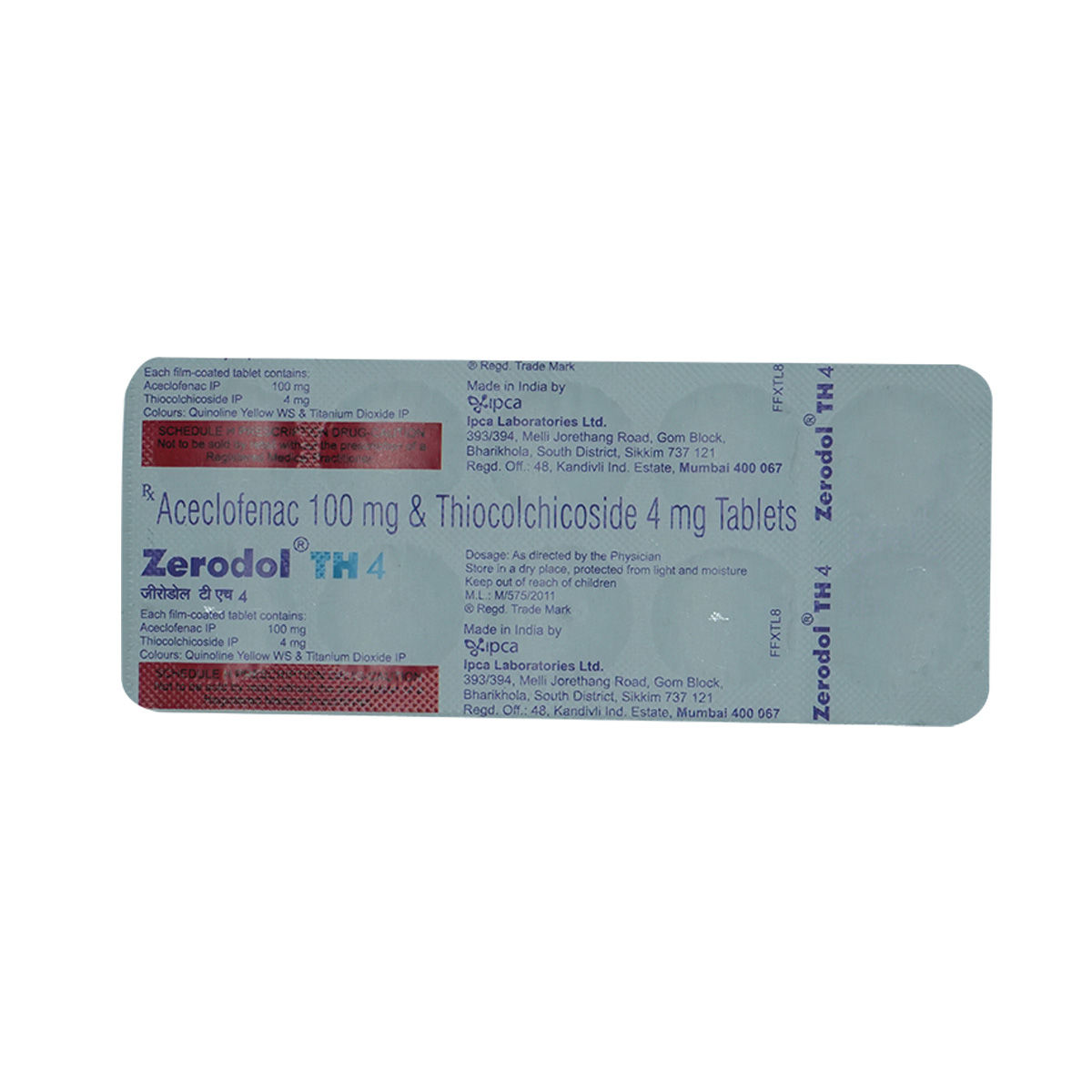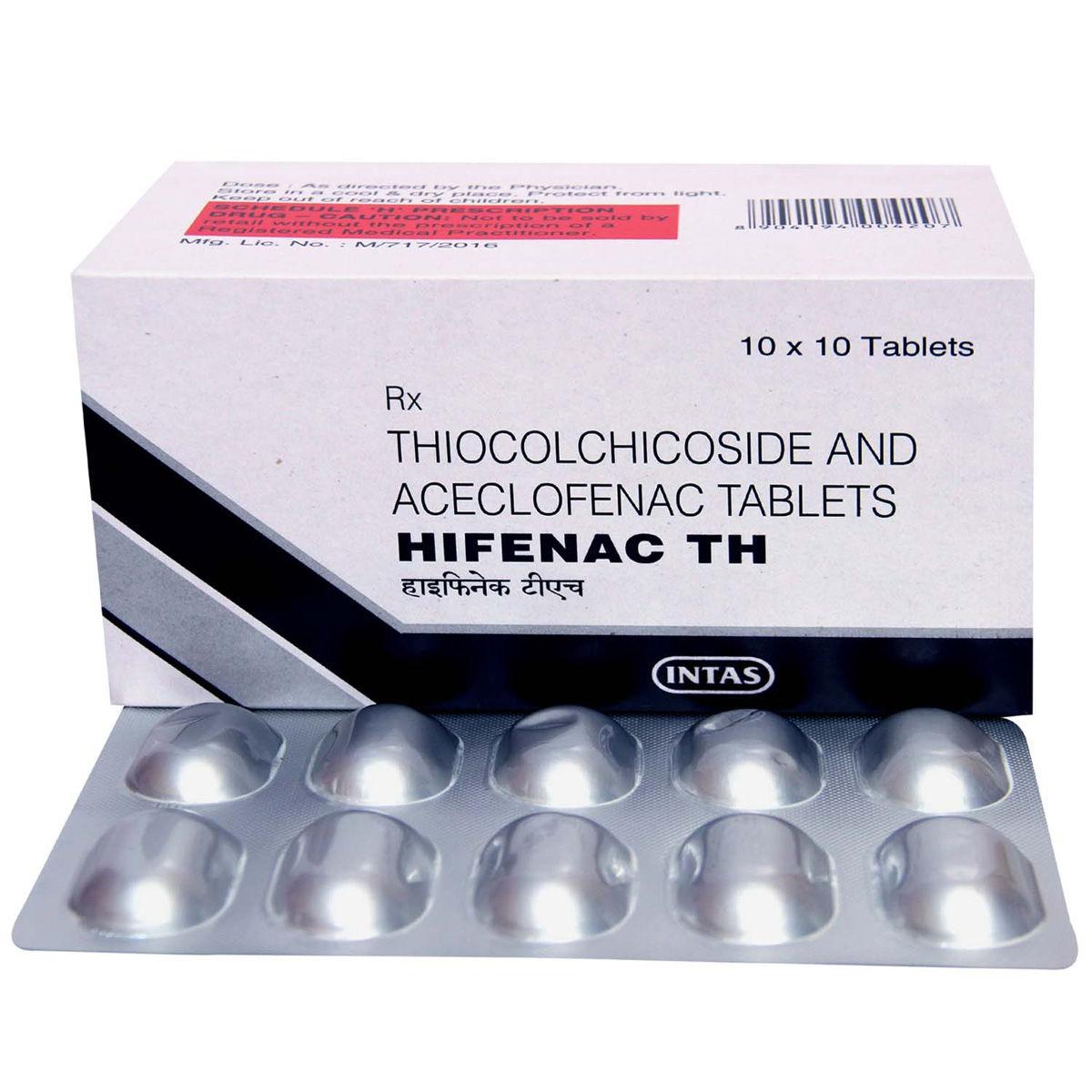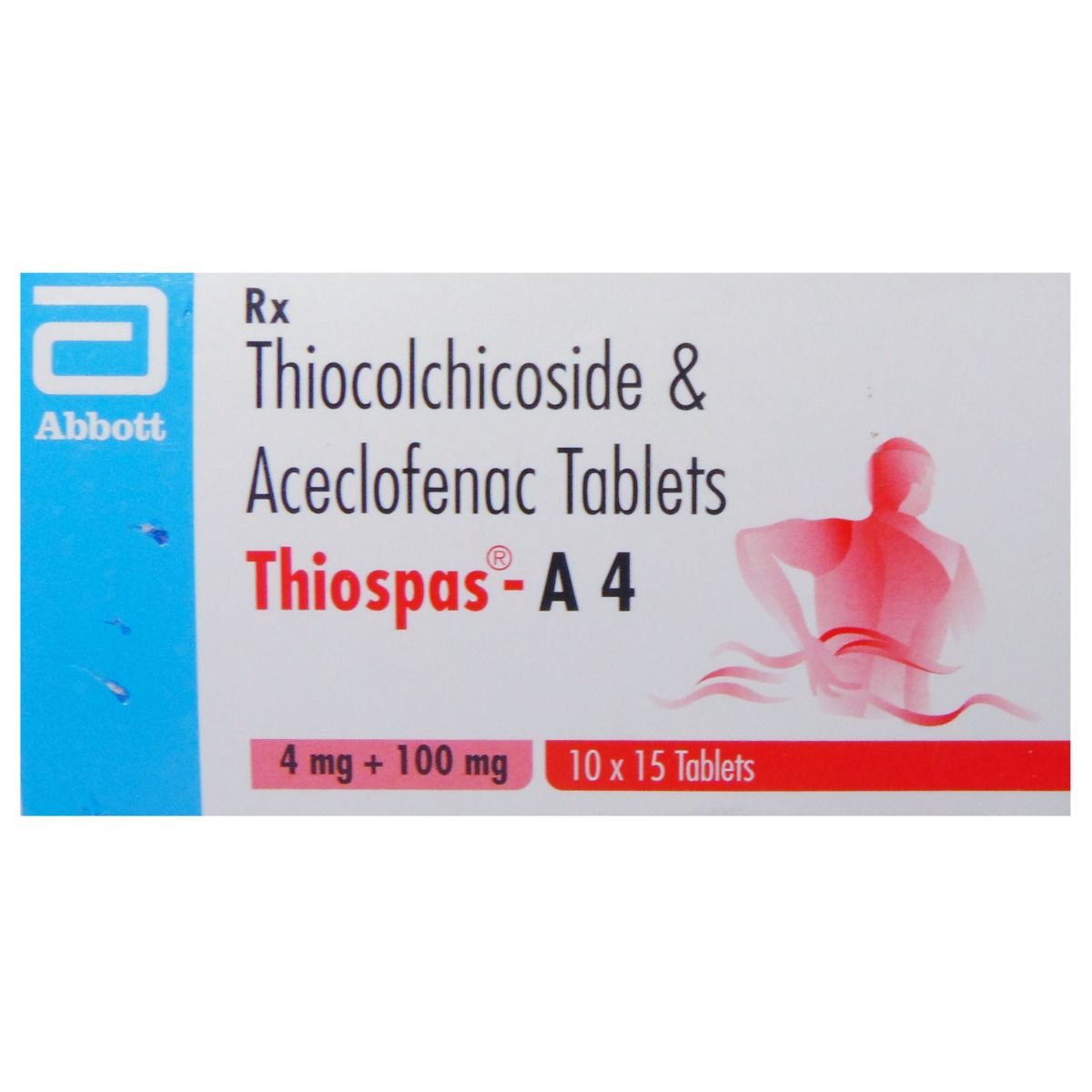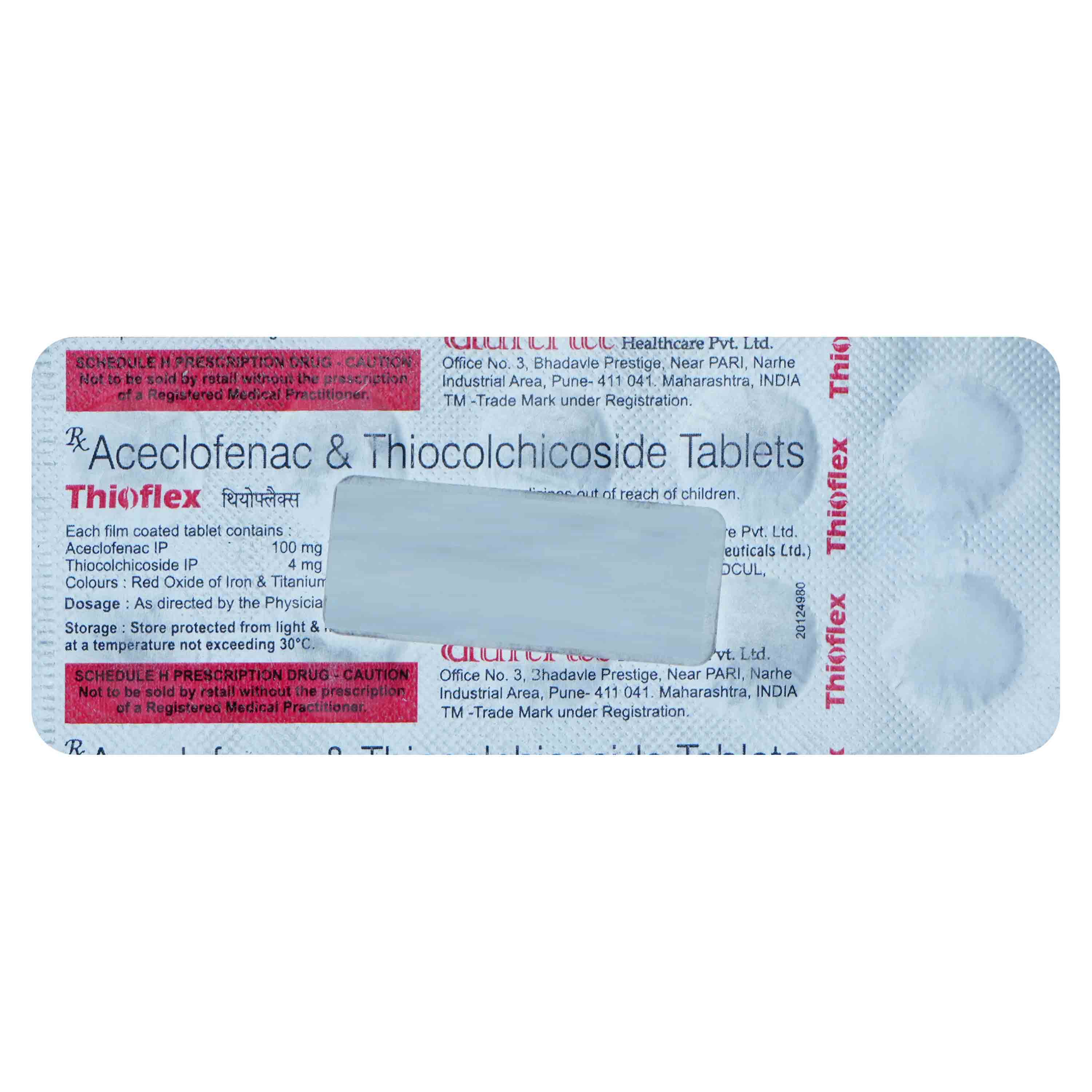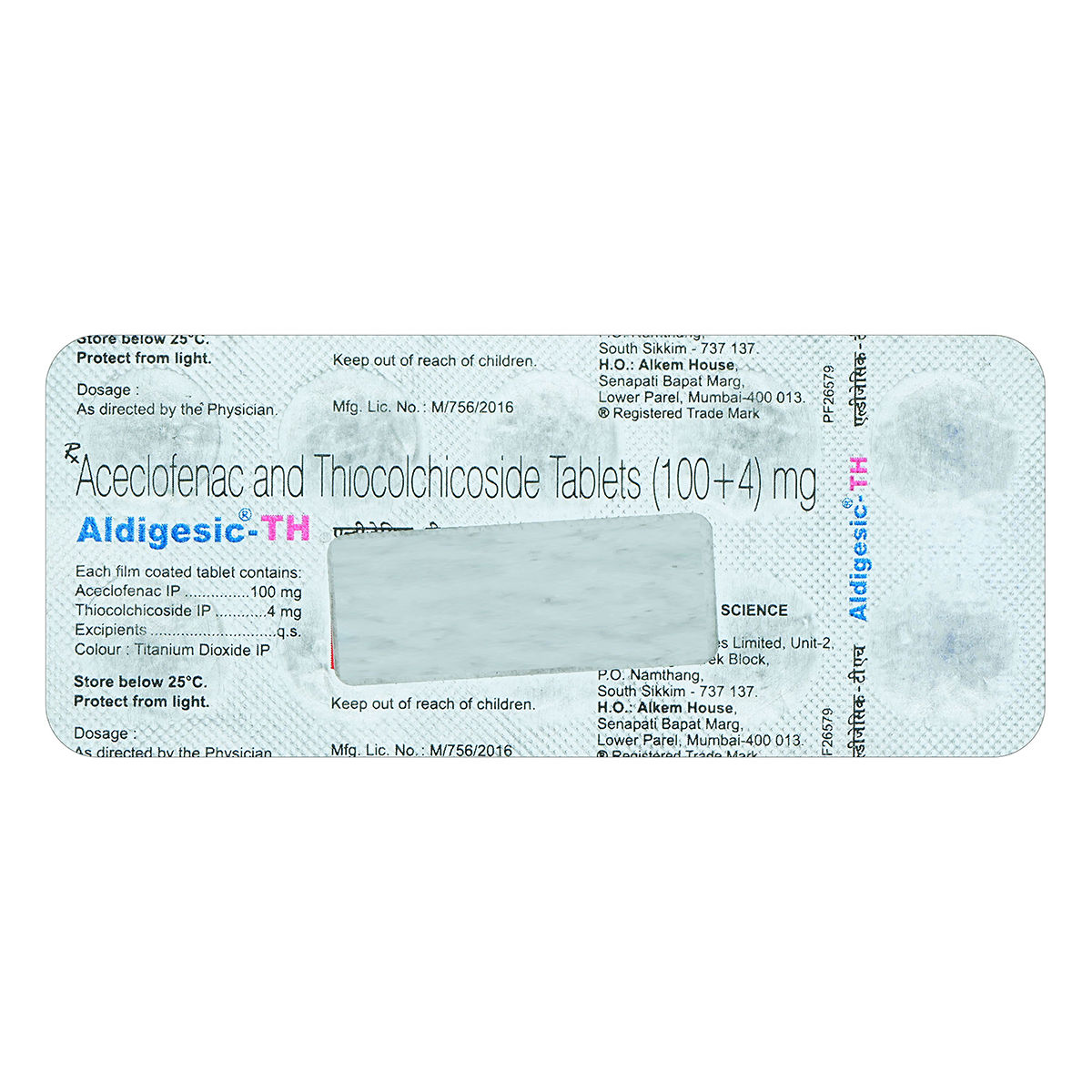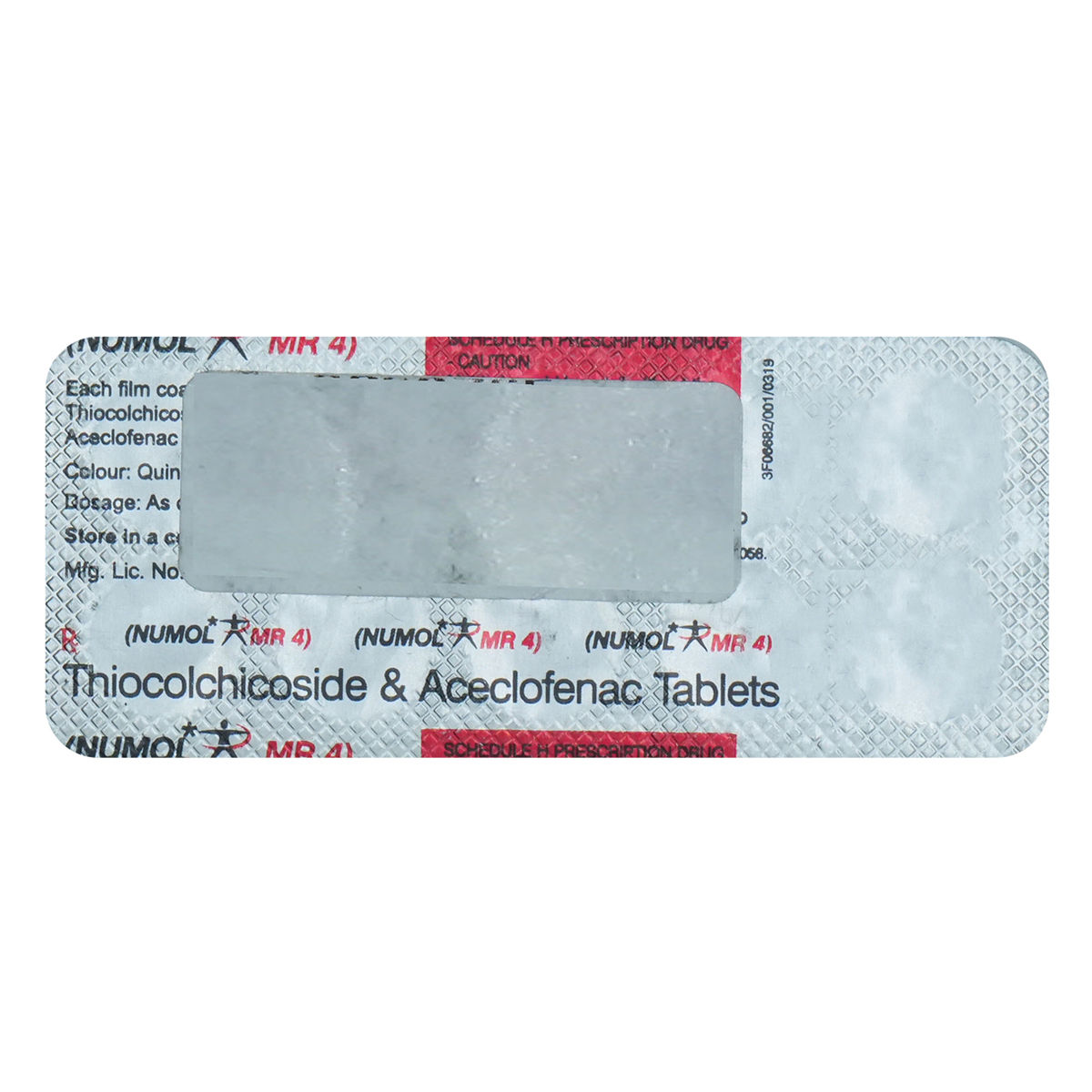Rumiside A 100mg/4mg Tablet
₹89.1*
MRP ₹99
10% off
₹84.15*
MRP ₹99
15% CB
₹14.85 cashback(15%)
Free Delivery
With Circle membership
(Inclusive of all Taxes)
This offer price is valid on orders above ₹800. Apply coupon PHARMA10/PHARMA18 (excluding restricted items)
Know Your Delivery Time
Provide Delivery Location

Whats That

Secure Payment

India's Most Trusted Pharmacy

Genuine Products
Composition :
Manufacturer/Marketer :
Consume Type :
Return Policy :
About Rumiside A 100mg/4mg Tablet
Rumiside A 100mg/4mg Tablet is a combination medication used to reduce and relieve pain due to muscle spasms (painful muscular contractions) associated with degenerative vertebral disorders, vertebral static problems, dorsal pain, low back pain, and torticollis (neck muscle contractions).
Rumiside A 100mg/4mg Tablet is a combination of two drugs: Thiocolchicoside (muscle relaxant) and Aceclofenac (a non-steroidal anti-inflammatory drug). Thiocolchicoside is a muscle relaxant that works on the centres of the spinal cord and brain. This helps relieve muscle stiffness and improves muscle movements, thereby relieving pain due to muscle spasms. Aceclofenac is a non-steroidal anti-inflammatory drug (pain killer) that works by blocking the action of cyclo-oxygenase (COX) enzyme in the body involved in the production of certain chemical substances, such as prostaglandins, that cause pain and swelling.
Take Rumiside A 100mg/4mg Tablet as prescribed. Your doctor will advise you on how often you take your tablets based on your medical condition. You may experience diarrhoea, dizziness, nausea, vomiting, stomach pain, or increased liver enzymes in the blood in some cases. Most of these side effects of Rumiside A 100mg/4mg Tablet do not require medical attention and gradually resolve over time. However, if the side effects persist or worsen, please consult your doctor.
If you are allergic to Rumiside A 100mg/4mg Tablet or any other medicines, please tell your doctor. Rumiside A 100mg/4mg Tablet is not recommended for children below 18 years of age. Avoid taking Rumiside A 100mg/4mg Tablet if you are pregnant, as it may cause harm to the foetus. Rumiside A 100mg/4mg Tablet is excreted in breast milk. Therefore, Rumiside A 100mg/4mg Tablet is contraindicated in breastfeeding women as it may cause adverse effects on the baby. If you have asthma, diabetes, high blood pressure, stomach ulcer, high cholesterol, chickenpox, porphyria (rare inherited disorder), systemic lupus erythematosus (an autoimmune disease), ulcerative colitis or Crohn’s disease (conditions causing swelling of the bowel, diarrhoea, bowel pain, vomiting and weight loss), galactose intolerance, Lapp lactase deficiency, glucose-galactose malabsorption, G-6-PD deficiency (a hereditary condition resulting in low red blood cell counts), fits, muscular hypotonia (decreased muscle tone), flaccid paresis (loose and floppy limbs), bleeding or blood clotting disorders, kidney, liver or heart diseases, inform your doctor before taking Rumiside A 100mg/4mg Tablet.
Uses of Rumiside A 100mg/4mg Tablet
Medicinal Benefits
Rumiside A 100mg/4mg Tablet is a combination of two drugs, namely, Thiocolchicoside and Aceclofenac, used to treat pain due to muscle spasms. Thiocolchicoside is a muscle relaxant that works on the centers of the spinal cord and brain. This helps relieve muscle stiffness and improves muscle movements, thereby relieving pain due to muscle spasms. Aceclofenac is a non-steroidal anti-inflammatory drug (pain killer) that works by blocking the action of the cyclo-oxygenase (COX) enzyme in the body that is involved in the production of certain chemical substances such as prostaglandins that cause pain and swelling.
Side Effects of Rumiside A 100mg/4mg Tablet
Diarrhoea
- Dizziness
- Nausea
- Vomiting
- Stomach pain
- Increased liver enzymes in the blood
Directions for Use
Storage
Drug Warnings
If you are allergic to Rumiside A 100mg/4mg Tablet or any other medicines, please tell your doctor. Rumiside A 100mg/4mg Tablet is not recommended for children below 18 years of age. Avoid taking Rumiside A 100mg/4mg Tablet if you are pregnant as it may cause harm to the fetus. Rumiside A 100mg/4mg Tablet is excreted in breast milk. Therefore, Rumiside A 100mg/4mg Tablet is contraindicated in breastfeeding women as it may cause adverse effects on the baby. Do not consume alcohol with Rumiside A 100mg/4mg Tablet as it may increase the risk of severe adverse effects. If you have asthma, diabetes, high blood pressure, stomach ulcer, high cholesterol, chickenpox, porphyria (rare inherited disorder), systemic lupus erythematosus (an autoimmune disease), ulcerative colitis or Crohn’s disease (conditions causing swelling of the bowel, diarrhoea, bowel pain, vomiting, and weight loss), galactose intolerance, Lapp lactase deficiency, glucose-galactose malabsorption, G-6-PD deficiency (a hereditary condition resulting in low red blood cell counts), fits, muscular hypotonia (decreased muscle tone), flaccid paresis (loose and floppy limbs), bleeding or blood clotting disorders, kidney, liver or heart diseases, inform your doctor before taking Rumiside A 100mg/4mg Tablet.
Therapeutic Class
Drug-Drug Interactions
Drug-Food Interactions
Diet & Lifestyle Advise
Regular exercise helps in muscle stretching so that they are less likely to spasm, tear and sprain. Mild exercises such as jogging and walking are helpful for muscle stretching.
Massages can also be helpful.
Avoid freezing and hot temperatures.
Avoid wearing tight-fitting clothes, instead, wear loose garments.
Rest well, and get plenty of sleep.
To avoid developing pressure sores, change your position at least every two hours.
Hot or cold therapy can help treat muscle spasms. Apply an ice pack or hot-pack on the muscle for 15-20minutes.
Stay hydrated, drink plenty of water.
Habit Forming
How Rumiside A 100mg/4mg Tablet Works
What if I have taken an overdose of Rumiside A 100mg/4mg Tablet
Alcohol
Unsafe
You are recommended to avoid alcohol consumption with Rumiside A 100mg/4mg Tablet as it may increase the risk of severe adverse effects.
Pregnancy
Unsafe
Rumiside A 100mg/4mg Tablet is not recommended for pregnant women, especially in the last 3 months of pregnancy as it may cause harm to the foetus. However, please consult your doctor if you are pregnant.
Breast Feeding
Unsafe
Avoid breastfeeding while taking Rumiside A 100mg/4mg Tablet as it may be excreted in breast milk and cause adverse effects in the baby. However, please consult a doctor if you are breastfeeding.
Driving
Caution
Rumiside A 100mg/4mg Tablet may cause drowsiness, tiredness, dizziness or vision problems in some people. Therefore, avoid driving if you feel any of these symptoms after taking Rumiside A 100mg/4mg Tablet.
Liver
Caution
Take Rumiside A 100mg/4mg Tablet with caution, especially if you have a history of Liver diseases/conditions. The dose may be adjusted by your doctor as required. Avoid taking Rumiside A 100mg/4mg Tablet if you have severe liver failure.
Kidney
Caution
Take Rumiside A 100mg/4mg Tablet with caution, especially if you have a history of Kidney diseases/conditions. The dose may be adjusted by your doctor as required. Avoid taking Rumiside A 100mg/4mg Tablet if you have severe kidney disease.
Children
Unsafe
Rumiside A 100mg/4mg Tablet is not recommended for children as the safety and effectiveness were not established.
Manufacturer/Marketer address
Author Details
We provide you with authentic, trustworthy and relevant information
Rumiside A 100mg/4mg Tablet Substitute

Zerodol TH 4 Tablet 10's
₹22.73per tabletHifenac TH Tablet 10's
₹23.40per tabletMiofree A 4 mg Tablet 10's
₹28.04per tabletZix-MR Tablet 10's
₹24.98per tabletTHICHOREN AC 4MG TABLET 10'S
by AYUR
₹21.51per tablet
FAQs
Disclaimer
Product Substitutes
Reference
- https://www.sanofi.in/-/media/Project/One-Sanofi-Web/Websites/Asia-Pacific/Sanofi-IN/Home/science-and-innovation/for-healthcare-professionals/product-information/Myoril.pdf?la=en
- https://www.ema.europa.eu/en/documents/referral/thiocolchicoside-article-31-referral-annex-iii_en.pdf
- https://iasispharma.com/wp-content/uploads/pdf/RELIEF_PIL_ENG.pdf
- https://www.medicines.org.uk/emc/files/pil.4240.pdf








